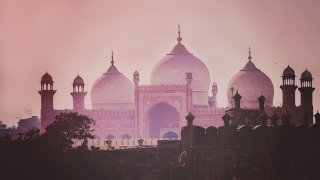Rough Waters Ahead for Pakistan’s New Government
New Prime Minister Shehbaz Sharif leads a fragile coalition that many Pakistanis view as illegitimate.
The new government in Pakistan has taken office amid political turmoil, polarization, and allegations of fraudulent elections. In his second tenure as Prime Minister, Shehbaz Sharif confronts dire challenges, including a weak coalition, political instability, heightened military involvement in politics, economic woes, and security concerns. The new government is unlikely to possess the capacity and capability to address these formidable obstacles effectively.
Shehbaz Sharif leads a fragile coalition comprising six parties, rendering his government susceptible to the intricacies of coalition politics. Sustained efforts are required to meet the demands of these partners and secure their ongoing support. On top of that, it faces challenges in implementing stringent economic reforms that may alienate coalition allies, who are hesitant to bear the brunt of the financial crisis and prioritize reaping the benefits of power-sharing instead. Sharif’s second tenure will, therefore, likely resemble his first.
The government is poised to remain hostage to the agitational politics of the opposition party Pakistan Tehreek-e-Insaaf (PTI), which alleges that its mandate was stolen in a rigged election last month and refuses to acknowledge the current government’s legitimacy. Following the loss of military support, former Prime Minister of Pakistan, Imran Khan, and his party faced a significant state crackdown after their removal from power via a vote of no confidence in April 2022, which resulted in the formation of Shehbaz Sharif’s first coalition government. Khan was arrested and detained on multiple charges while his party leaders were pressured to depart from the party. Furthermore, the party’s election symbol, the cricket bat, was revoked, and they were not permitted to conduct a free election campaign.
Despite facing numerous challenges, the party surpassed all others and secured more seats than its major rivals, the Muslim League Nawaz (PML-N) and the Pakistan People’s Party (PPP). Through effective utilization of social media, the party successfully mobilized its voter base and altered the anticipated election outcome. Pakistan’s powerful military supported Nawaz Sharif (Shehbaz’s brother) and his party, PML-N, raising expectations of their victory with a majority in the election. However, the unexpected election results led to a coalition government between the PML-N, the PPP, and other smaller political parties to prevent the PTI from assuming power. PTI has accused both parties of stealing its mandate with military backing and election rigging. With the PTI holding a significant bloc in the parliament, it is anticipated that the opposition party will persist in obstructing the government’s proceedings, further contributing to political instability.
Another formidable constraint facing this government is the military’s outsized role in the country’s politics. The influential army is poised to maintain its sway and retain its “kingmaker” role. During his first coalition government, Shehbaz Sharif ceded more authority to the military, a trend unlikely to be reversed. Consequently, the army continued shaping security and foreign policy. This means prospects for improving relations with India and fostering trade to ameliorate Pakistan’s dire economic situation remain bleak.
Pakistan is currently grappling with a severe economic crisis, necessitating tough decisions from the government to secure an IMF bailout as the expiration of the current one nears (end of March). During Sharif’s previous term as prime minister, Pakistan struggled for months to secure a $3 billion bailout from the IMF to avert default.
Due to the government’s inability to implement necessary structural reforms, Islamabad will probably resort to increased borrowing, additional bailouts, and accruing more debt. Consequently, this will prolong inflation, an ongoing energy crisis, low growth, and a heavy foreign debt burden. Inflation rates are hovering around thirty percent, and poverty has also surged in recent years, with nearly forty percent of the population living below the poverty line. The economic crisis is anticipated to exacerbate in the days ahead.
The terrain of human development also reflects a deteriorating situation. Per the 2022 Global Human Development Report by the United Nations Development Programme (UNDP), Pakistan’s decline from the 161st to the 164th position out of 192 on the Human Development Index demands deep contemplation. This downward trend in human development indicators, including literacy, education, health, gender equality, and social justice, is poised to exacerbate political instability and economic challenges.
The security environment in Pakistan also remains precarious, primarily due to concerns about potential terrorist attacks from Tehreek-i-Taliban Pakistan (TTP), which maintains safe havens in Afghanistan. Despite Islamabad’s public warnings to the Taliban government to take action against the TTP, meaningful steps have not been taken, either due to capacity constraints or a lack of willingness on the part of the Taliban. The TTP’s objective is to establish a Taliban-like government in Pakistan, which poses a significant threat. In 2023, Pakistan suffered nearly 1000 casualties in terrorist attacks, underscoring the ongoing danger. Moreover, a recent cross-border attack from Iran has compounded Pakistan’s security concerns. Additionally, prospects for improved relations with India remain unlikely, primarily due to the irreconcilable positions held by both countries regarding Kashmir.
Addressing these challenges becomes increasingly difficult within a fraught political environment where constraints on the government’s authority severely limit its capacity to implement significant policy measures. Consequently, Pakistan is poised to remain on a trajectory marked by turbulence and instability.
Saira Bano is an Assistant Professor of Politics at Thompson Rivers University. Her primary research interests are International Relations theories, great power politics, security issues, the nuclear non-proliferation regime, nuclear weapons concerns in South Asia, and the intersection of domestic politics and foreign policy. She received her PhD from the Centre for Military, Security, and Strategic Studies (CMSS) at the University of Calgary. Follow her on X @sairaban1.
Image: Shutterstock.com.

